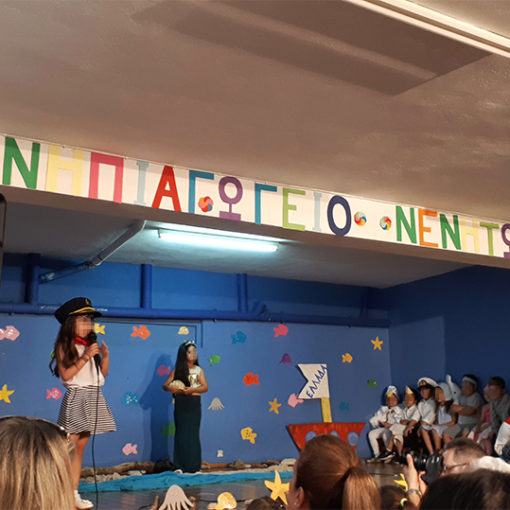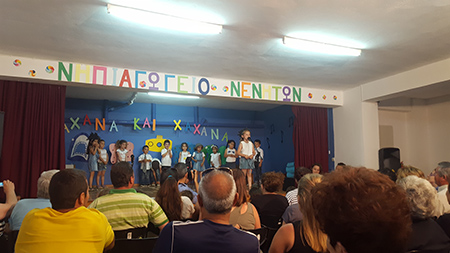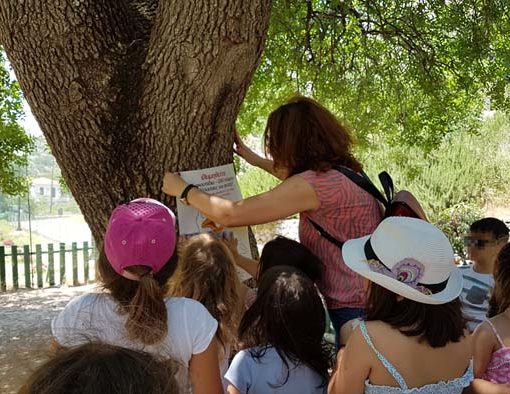The 28th of October is a very special day for the Greeks. This year I got the opportunity to learn a lot about the history of this national holiday and I could even gather some first-hand experiences of the traditions and celebrations.
About the history. The “Επέτειος του Όχι” which means “Anniversary of the No” dates back to the 28th of October, 1940. At 3am that day, the Greek Prime Minister, Ioannis Metaxas, archived an ultimatum from Benito Mussolini. At this time, the Axis Powers of Italy and Germany were already at war with the Allies. A refusal of the ultimatum, which demanded a free passage for the Italian army through Greece, would be seen as complicity with the enemy and therefore directly lead to war. Even though Prime Minister Metaxas directly faced a war, he didn’t want his country to be enslaved by the Axis Powers but rather wanted to sacrifice it for good. That is why he replied with “Όχι!” (no). With this answer, he made himself a hero of the Greeks. It was the start of the Greco-Italian War and also later Greece’s entry into World War II. This gave great national pride to the people, and everyone was enthusiastic about it. It spread quickly throughout the whole country, and people agreed that “Όχι” had been the right answer to the ultimatum.
The Greco-Italian War started a few hours after the reply to the ultimatum was sent. Due to the lack of planning and preparations on the side of Mussolini and good communications, knowledge of the territory and of their strengths and weaknesses, and of course their motivation and the support from Britain’s Royal Force, the Greek army could defeat the Italians. A great success!
After that, in April 1941, however, a counterattack by the German army was launched, and the Greeks could not defeat themselves against that. Three and a half years of brutal occupation.
Nevertheless, the defeat of the Italians was a huge success, and it motivated the Allies and made the Greeks into heroes. A lot of patriotic songs have their roots there, and it was inspiring for everyone.
This important part of Greek history gets celebrated every year, over and over again. Everyone comes together, and large student and military parades are held in all the smaller and bigger city centers of Greece. Everyone celebrates together that they stood up for themselves in the past and did not allow themselves to be defeated by the much more intimidating and much larger Axis Power.

I personally experienced the celebration at first together with the children of the kindergarten I offer my volunteering service to. The week before the national holiday, we prepared a lot of decorations. I got to hang up Greek flags in the hallway and the classroom of the kindergarten while the children learned about the history of their country. They also got to know the different flags of the countries involved in the events of 1940. The coloring in of the Greek flags was an activity we did, for example. Moreover, we also had a lot of fun painting peace signs and folding paper hats together. We also learned how to behave while the national anthem is playing and how to march to the rhythm of patriotic songs. For me, it was really exciting because I got to know a lot of Greek history and experience their national pride and the way children are getting educated about it. It is something completely new for me, and I very much enjoyed being a part of it all. On the 27th of October, the children showed all of the prepared things to their parents. They put on the paper hats, and we started some marching music. They marched through the schoolyard, and all the parents applauded proudly. Then they were free to enjoy the national holiday with their families.
The next day, all of the volunteers in my project tried to get as many impressions of the celebrations in our area as possible. At first, we watched the parade in Vrontados. All the participants walked in front of the city hall, and the mayor announced every group marching past and held a little speech. At first, the music corps marched along the street and stopped in front of the mayor. Their music accompanied the parade the whole time, and all the other participants marched according to their rhythm. The local scout groups,
school classes, and dance clubs, as well as people wearing traditional clothes and representing different kinds of associations in Vrontados. It was all really festive, and I enjoyed it a lot. It was also great to see familiar faces among the children marching. Some of the children of my kindergarten participated, and I also saw some teachers and parents. Moveover, it is just really nice to see how the whole city comes together and celebrates. Everyone was just in a very good mood. After the parade, all the people gathered on the city square in front of a sailors’ monument and watched traditional dances that different groups prepared. There were groups of children as well as teenagers

dancing Συρτός (Sirtos) among other traditional Greek dances. Συρτός is the traditional dance in our area. I think it is really impressive how the people keep the tradition alive and how even the little children already learn things like that. It was really nice to watch, and everybody had a lot of fun.
After that, we directly rushed to the city of Chios to watch the parade there. As I was already really impressed by the rather small parade in Vrontados the size of the one in Chios really surprised me. There were a lot of people, and the parade was huge with so many participants. And not only the children and the local people marched along to the songs, but also many representatives of the military, the marines, and the air force. Especially this really impressed me. All the different sectors of the military showed off their equipment, and seeing so many people in the same uniform was both astonishing and intimidating at the same time. Of course, the whole city was decorated with Greek flags, and since there was a parade, no cars could enter. It was a very unique and exciting experience to be part of the audience, standing on the side of the road, clapping and cheering for the parade.

But with the end of the parade, the national holiday wasn’t over yet. All the streets were filled with people, and it was hard to get a table at one of the pretty cafes at the port. But luckily we were able to find a spot in a cafe and therefore could enjoy a hot chocolate and some Λουκουμάδες (honey puffs), a typical Greek street-food dessert. This was the perfect ending to a really good day.
In the last few days, I learned a lot about the history of Greece, with its triumphs but also with its tragic downsides. But that’s not all. I got to know a little bit more about the traditions and the culture of the Greeks and experienced their national pride firsthand. If you ever find yourself in Greece on Όχι-day, you really have to watch one of the parades and experience everything by yourself!
sources:
https://www.greece-is.com/october-28-ochi-day/ (Duncan Howitt-Marshall, 3.11.2022)
https://www.sabaton.net/historical-facts/start-of-the-greco-italian-war/ (sabaton editors, 3.11.2022)




